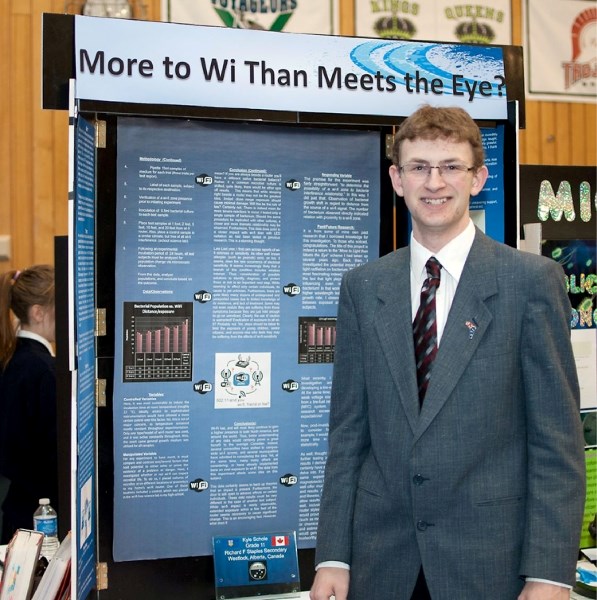Anyone who has been following the local science fair scene for the past couple years will not be surprised to learn Kyle Schole has once again earned the right to compete at the national fair.
Although health issues will prevent him from attending this year, the Grade 12 R.F. Staples student’s victory at the Edmonton Regional Science Fair April 8-9 is nonetheless a remarkable accomplishment.
Despite having earned the right to compete at nationals in four previous years, Schole was nonetheless surprised he won again.
“It was pretty exciting,” he said. “I’ve got to say I wasn’t expecting to do so well this year, just between school and being distracted and not having the time to dedicate that I really would have liked to.”
He won first place in the Life Sciences category for his project examining the effects of wireless networks on biological organisms — specifically, the claim that some humans suffer from electromagnetic sensitivity.
“It’s not very prevalent, but every once in a while there’s a case reported of it, and that’s not a very good thing if this is the case,” he said.
Schole conducted his experiment quite simply. He set out Petri dishes at various distances from the wireless Internet router in his family’s home and compared the bacterial growth in each dish. He found that within five feet of the router, bacterial growth was distinctly lower than in the dishes further away.
“It’s not telling me that wireless Internet is apocalyptically horrible, because obviously it isn’t,” he said. “By far the vast majority of people can operate quite normally whether they’re exposed to Wi-Fi or not.”
The results of his experiment do seem to indicate that caution could be required and that further study is needed, however.
“Extended exposure right by your router might not be the best idea, and it does prop the door of discussion open to the fact there might be something that requires more investigation.”
He is unfortunately suffering a health issue related to a collapsed lung right now, so won’t be able to participate in nationals, but is satisfied that his spot will go to another “very worthy” young scientist.
Schole has competed at four other national competitions, as well as taking part in a National Youth Science Forum in Australia in 2009. Furthermore, he has been invited to present his project from last year at an international competition in Bratislava, Slovakia this summer.
A European organization called MILSET, which is a French acronym for the International Movement for Leisure Activities in Science and Technology, hosts an annual international science expo. Barring any further health issues, Schole will present the project he did last year.
That is not the only attention last year’s project got, either.
Schole’s experiment, which examined using tire-eating bacteria to create fuel cells, was also featured on the Discovery Channel’s Daily Planet Monday, April 18. The five-minute segment follows Schole from his farm near Busby to school for a day and ultimately to the Westlock Healthcare Centre where he demonstrate a small fuel cell using his discovery.
Despite being featured on national television, Schole said the experience has not let the experience go to his head.
“It was really humbling getting featured on such a show,” he said. “The fact they considered me worth spending some time on was a really humbling feeling.”
Ultimately, the reason for his success all boils down to hard work and perseverance.
“I’m just dedicated enough to persevere and go after things. You don’t have to be a straight-A student to go after things and have incredible experiences like that,” he said.
“I’ve made some pretty good friends and seen some crazy things throughout my travels. I’ve had some opportunities that many others don’t get, so I’m very thankful for that.”

